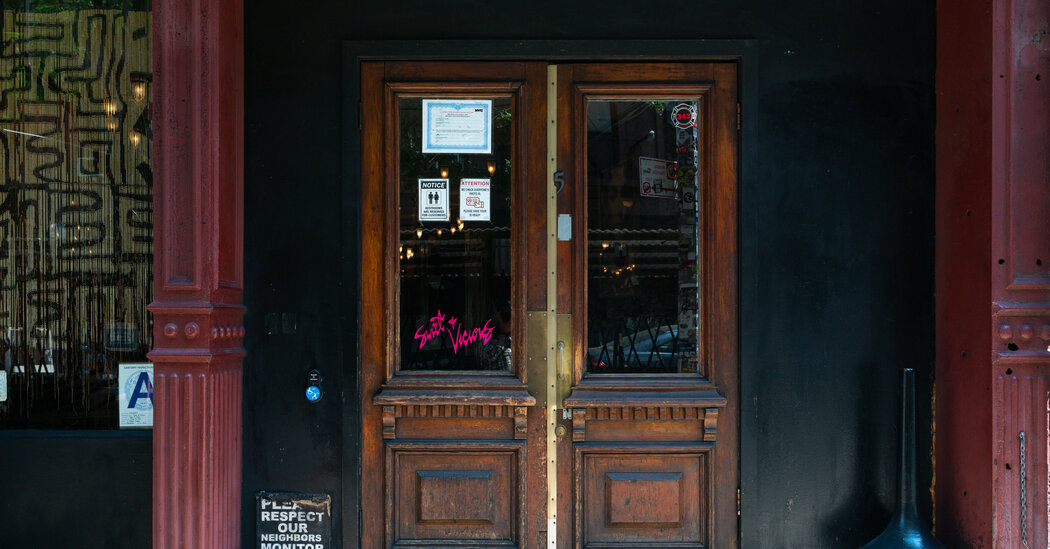
Sweet & Vicious, a downtown Manhattan bar and restaurant popular for its “jargaritas” — frozen margaritas served in giant Mason jars — has been a nest of sexual, racial and gender-based harassment where workers endured racial slurs, had tips taken by the management and went unpaid for work, according to a 16-month investigation by Letitia James, the New York State attorney general.
As part of a settlement brokered by the attorney general’s office, the owner, Hakan Karamahmutoglu, will pay $500,000 to be split among at least 16 employees for violating state and city human rights and labor laws, Ms. James said Wednesday at a news conference.
“For far too long, workers in the hospitality industry have been forced to weather a pervasive culture of sexual harassment and discrimination that has gone unreported,” she said in a statement. “Every New Yorker should be able to go to work free from fear of abuse and degradation regardless of industry.”
Mr. Karamahmutoglu said in a statement that many of the allegations were untrue or grossly misleading and did not reflect his character or perspective. He said he signed the agreement last Thursday as a way to avoid the cost of a continued investigation, avoid future litigation and allow everyone to move on.
“I’ve given back to the community and city that I love and have employed hundreds of employees across all backgrounds,” his statement said. “We will continue to welcome everyone into a positive and inclusive environment. Those who know me will know that to be true, and I ask those who do not know me to not rush to judgment.”
The investigation began in early 2021 after several women who worked at the bar banded together and spoke with a lawyer, who directed them to the attorney general’s office. The investigation included dozens of interviews with former and current employees.
One was Katy Guest, 33, a former Sweet & Vicious bartender who said she was surprised that the harassment she and others experienced regularly would matter to the attorney general.
“We basically didn’t know that someone at that level of power would put a spotlight on these things that happen every day in the hospitality industry,” she said in an interview. “It’s gone on behind closed doors for so long that we just grew used to it.”
The bar, on Spring Street in NoLIta, was a hotbed of harassment by both managers and customers, Ms. James said. According to her findings, the owner routinely insulted female employees, calling them “bitches” and “cows,” and scrutinized their appearance, commenting on their bodies and clothing. He also called workers “terrorists,” “crackheads” and “trash,” Ms. James said.
In audio messages left on an employee’s WhatsApp account in 2020 and shared with The New York Times, Mr. Karamahmutoglu said women who worked for him needed to be pretty, lean and active. He wanted bartenders who were “tall, blond, beautiful and sexy like the women who worked at the bars in Ibiza.”
Kim Anderson, who tended bar at the often-packed bar and restaurant for six months in 2019 to help pay off graduate school bills, said, “There was a lot of pressure to behave in a certain way, dress provocatively and look a certain way.” She suspected she didn’t get the best shifts because she didn’t present herself the way management wanted; she said, for instance, that she was often told to put on more makeup.
The bar’s managers were almost exclusively male. Some, according to the settlement document, regularly made unwanted sexual advances, including one manager who repeatedly rubbed his genitals against employees and another who announced the color of a worker’s underwear and declared in vulgar terms that he wanted to have sex with her.
The management tolerated customers who threatened to stab, rape and beat employees, the attorney general alleged. She said the owner and managers frequently used racial and gay slurs when speaking about workers.
Poor working conditions cited in the investigation included eight-hour shifts that bartenders spent on their feet without breaks, workweeks that stretched beyond 40 hours without overtime, a stricter code of conduct for female bartenders than for men and instances when tips left on credit cards never made it to the workers.
The settlement requires Sweet & Vicious to revise its anti-discrimination and harassment training materials and to display notices about anti-discrimination and harassment rights and responsibilities. The owner will have to submit periodic reports to the attorney general’s office showing that the company is complying with the terms of the settlement.
The investigation is the latest in a series of state investigations targeting sexual abuse and harassment in the hospitality industry. The first came in January 2020, when Ken Friedman, the principal owner of the Spotted Pig restaurant in Manhattan, agreed to pay $240,000 and a share of his profits to 11 former employees who had accused him of sexual harassment, discrimination and retaliation.
The chef Mario Batali and his former partner Joe Bastianich were next. In July 2021, Ms. James said the two presided over a sexualized culture so rife with harassment and retaliation that it violated state and city human rights laws.
The two men and Pasta Resources, the company formerly known as the Batali & Bastianich Hospitality Group, agreed to pay a total of $600,000 to at least 20 women and men who said they were sexually harassed while they worked at the Manhattan restaurants Babbo, Lupa or Del Posto, which until it closed permanently in 2021 was the crown jewel among the men’s holdings.




